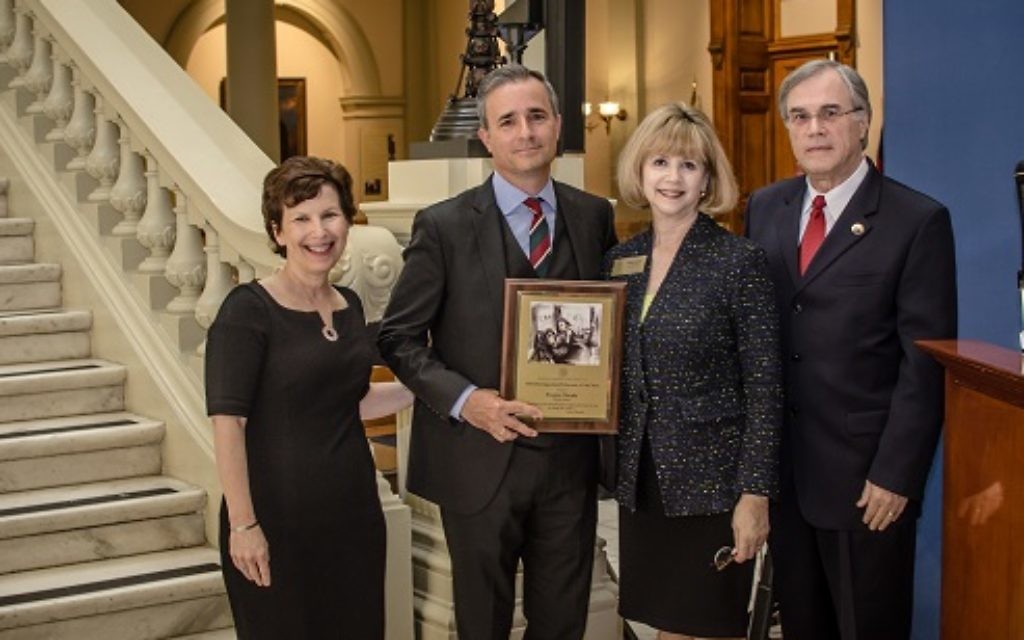Confronting Anti-Semitism Changes Lives in Montana
The rabbi from Whitefish tells an ADL award dinner about the threat posed by hate speech and Nazi imagery.

After enduring abuse by white supremacists, Rabbi Francine Roston of the Glacier Jewish Community/B’nai Shalom in Whitefish, Mont., has firm views about how to respond to the dark side of civil discourse.
In late 2016 and early 2017, Rabbi Roston, the small Jewish community and the town itself were “terrorized, harassed and threatened by cowards who hide behind computer screens and the First Amendment,” she said.
There are, she said, a dozen Jewish families in Whitefish (population 7,279) and about 135 Jewish households in the Flathead Valley, which encompasses a significant swath of northwestern Montana.
Get The AJT Newsletter by email and never miss our top stories Free Sign Up
Rabbi Roston’s tormentors came from various ends of the alt-right, a generic term for a loose collection of neo-Nazis and other groups whose philosophy features a virulent hatred of Jews.
One resident of Whitefish whose son is a leader of that movement made unfounded accusations against a local Jewish real estate agent and exacerbated the situation.
Rabbi Roston shared the lessons she learned Thursday, Nov. 2, as the Anti-Defamation League’s Southeast Region bestowed its Abe Goldstein Human Relations Award on Brendan Murphy, the much-honored teacher of history, particularly the Holocaust, at the Marist School, a Catholic school in Brookhaven.
“This is a very difficult story for me to tell,” Rabbi Roston told an audience of some 250 people in a ballroom at the St. Regis Atlanta hotel in Buckhead. “This in no way feels over for me. … Our lives will never be the same. We live with the effects of the trauma every day.”
While she acknowledged that “hate has a First Amendment right,” Rabbi Roston said, “I strongly believe that Holocaust imagery connected with denigrating language against Jewish people is a threat and should be viewed as a threat by the government and therefore not protected speech.”
The threats brought national attention to Whitefish and to the rabbi, who moved there with her husband and their son and daughter in 2014, feeling burned out after 16 years as a rabbi at Conservative congregations in New Jersey.
Her first piece of advice for dealing with white supremacists is not to confront them. “Don’t feed the trolls,” don’t respond to those spewing bigoted venom online, she said.
If they show up in your town, “you don’t show up,” Rabbi Roston said. “You go to your own rally, and you rally for what you believe in … because goodness also has a First Amendment right.”
A threat (unfulfilled) to hold a white supremacist march in Whitefish was countered by an event at which members of a supportive community gathered and consumed some 350 bowls of matzah ball soup — after Rabbi Roston helped teach a couple of dozen people how to prepare matzah balls.
The town event and such personal acts as lighting Chanukah candles with her children and other Jewish families were “our way of standing up, of bringing light into darkness,” Rabbi Roston said, her voice cracking with emotion.
The backing of the people of Whitefish taught her that “there are more good people in this world, … and they will stand up for love.”
She voiced gratitude for the support of elected officials, ranging from the Whitefish City Council, which passed repeated resolutions, to Montana’s governor, who met with her and other members of the Jewish community, to the state’s two U.S. senators and single U.S. representative on Capitol Hill.
After telling her story, Rabbi Roston joined a panel discussion with Vernon Keenan, the director of the Georgia Bureau of Investigation, and Allison Padilla-Goodman, the Southeast regional director of the ADL.
Klansmen once hid their faces behind masks (until Georgia passed an anti-mask law); now “the Internet is the new mask for the day,” Keenan said.
Technology “makes it more difficult for law enforcement to act,” but the GBI director praised the ADL’s contribution to “aggressive investigation and prosecution.”
“And I am tired of apologizing for the state of Georgia for not having a hate crimes law,” Keenan said.
Georgia is one of five states without such a law, whose passage by the General Assembly is a priority for the ADL.

In presenting Murphy with the Goldstein Award, Steve Pepper, the ADL Southeast board chair, called him “an incredible educator for what he has done.”
For his part, Murphy recalled that a spark for the programs he created some 20 years ago (including an annual “Bearing Witness” student trip to Holocaust sites in central Europe) came while teaching world history to ninth-graders and feeling that he had “just 12½ minutes” to teach about the Holocaust.
At the beginning of the event, Pepper said, “It’s not just rhetoric when we say our work has never been more important.”
Earlier that day, the ADL released a report that cited a 67 percent national increase in anti-Semitic incidents, ranging from verbal and online abuse to physical attacks on Jewish institutions, in the first three quarters of 2017 compared with the same period in 2016.
“Of the incidents reported, there has been a disturbingly high number of anti-Semitic bullying and vandalism in K-12 schools and college campuses across the U.S.,” the ADL said.
In the ADL’s Southeast Region (Georgia, Alabama, South Carolina and Tennessee), the increase was 100 percent, double the same period a year earlier.




comments